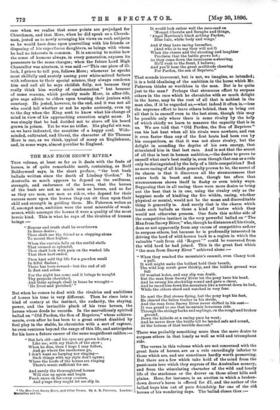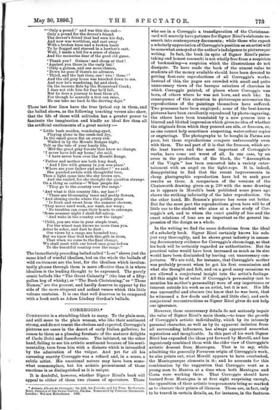THE MAN FROM SNOWY RIVER.* True volume, at least so
far as it deals with the feats of horses, is of quite remarkable merit, containing, as Rolf Boldrewood says, in the short preface, "the best bush ballads written since the death of Lindsay Gordon." In Australia so much appears to depend on the swiftness, strength, and endurance of the horse, that the heroes of the bush are not so much men as horses, and so far as they are men, are men as riders, who depend for their success more upon the horses they can sit than upon their skill and strength in guiding them. Mr. Paterson writes as if, amongst men, ambition were the most miserable of weak- nesses, while amongst the horses it were a quality of the most heroic kind. This is what he says of the rivalries of human beings :— "Honour and truth shall be overthrown
In fierce desire; Thou shalt use thy friend as a stepping-stone To mount thee higher.
When the curtain falls on the sordid strife That seemed so splendid, Thou shalt look with pain on the wasted life That thou hast ended.
Thou hast sold thy life for a guerdon small In fitful flashes ;
There has been reward—but the end of all Is dust and ashes.
For the night has come and it brings to naught Thy projects cherished, And thine epitaph shall in brass be wrought- ' He lived and perished.'"
But when he comes to deal with the rivalries and ambitions of horses his tone is very different. Then he rises into a kind of ecstacy at the instinct, the audacity, the staying_ power, and the invincible pluck of his true heroes, the heroes whose deeds he records. In the marvellously spirited ballad on "Old Pardon, the Son of Reprieve," whose achieve- ments, even after he has been to a great extent disabled by foul play in the stable, he chronicles with a sort of rapture, he even ventures beyond the range of this life, and anticipates for his hero a future career of the same magnificent calibre :—
" But he's old—and his eyes are grown hollow ; Like me, with my thatch of the snow ;
When he dies, then I hope I may follow, And go where the racehorses go, I don't want no harping nor singing— Such things with my style don't agree;
Where the hoofs of the horses are ringing There's music sufficient for me.
And surely the thoroughbred horses Will rise up again and begin Fresh races on far-away courses, And p'raps they might let me slip in.
The Man front Snowy River, and Other Verses. By A. B. Paterson. London: Macmillan and Co. It would look rather well the race-card on
'2elongst Cherubs and Seraphs and things, 'Angel Harrison's black gelding Pardon, Blue halo, white body and wings.'
And if they have racing hereafter, (And who is to say they will not?) When the cheers and the shouting and laughter Proclaim that the battle grows hot ; As they come down the racecourse a-steering, He'll rush to the front, I believe; And you'll hear the great multitude cheering For Pardon, the son of Reprieve."
That sounds irreverent, but is not, we imagine, so intended; it is a bold idealising of the ambition in the horse which Mr. Paterson thinks so worthless in the man. But is he quite just to the man? Perhaps that strenuous effort to surpass others in the race which he chronicles with so much delight in the horse, may be the root of all that is noblest in the man also, if it be regarded as,—what indeed it often is,—less the supreme effort to leave others behind, than to bring out all that is in oneself even to the last atom, though this may be possible only where there is some rivalry by the help of which chiefly we learn to measure the capacity that is in us. We are told that "Old Pardon, the Son of Reprieve" ran his last heat when all his rivals were nowhere, and ran it even faster than any of the first heats had been run by his competitors, so that it was not sheer rivalry, but the delight in sounding the depths of his own energy, that stimulated him in that last race. And is not that the secret of all that is best in human ambition,—the desire to prove to' oneself what one's best really is, even though that can as a rule only be distinguished by the help of a little competition? Bad as mere racing of all kinds generally proves to be, the secret of its charm is that it discovers all the strenuousness that exists both in beast and man, though too often that strenuousness shows itself in flashy or even tricky ways. Supposing that in all racing there were more desire to bring out the best that is in one, using the rivalry only as the happiest mode of kindling the fire within, racing, whether physical or mental, would not be the mean and discreditable thing it generally is. And surely that is the charm which lends such ballads as these a kind of lustre which they would not otherwise possess. One feels this nobler side of the competitive instinct in the very powerful ballad on "The Man from Snowy River," who, though he distances all his rivals does so not apparently from any excess of competitive ardour to surpass others, but because he is profoundly interested in driving the herd of wild-horses back to a region in which the valuable "colt from old ' Regret ' " could be recovered from the wild herd he had joined. This is the great feat which "the man from Snowy River" achieved alone :—
"When they reached the mountain's summit, even Clancy took a pull.
It well might make the boldest hold their breath,
The wild hop scrub grew thickly, and the hidden ground was, full Of wombat holes, and any slip was death.
But the man from Snowy River let the pony have his head, And he swung his stockwhip round and gave a cheer, And he raced him down the mountain like a torrent down its bed,. While the others stood and watched in very fear.
He sent the flint stones flying, but the pony kept his feet,.
He cleared the fallen timber in his stride,
And the man from Snowy River never shifted in his seat—
It was grand to see that mountain horseman ride.
Through the stringy barks and saplings, on the rough and broken.
ground,
Down the hillside at a racing pace he went ;
And he never drew the bridle till he landed safe and sound.
At the bottom of that terrible descent."
There was probably something more than the mere desire to surpass others in that lonely as well as wild and triumphant ride.
The verses in this volume which are not concerned with the great feats of horses, are as a rule exceedingly inferior to those which are, and are sometimes hardly worth preserving-. But there are a few which take hold of the mind from the passionate love which they express of the Australian scenery,. and from the stimulating character of the wild and lonely life of the stockman or the drover on those silent hills and plains. Here, for instance, is an auction in which a broken- down drover's horse is offered for 2I., and the author of the ballad buys him out of pure friendship for one of the old heroes of his wandering days. The ballad closes thus :—
'"Only a pound !' and was this the end— Only a pound for the drover's friend. The drover's friend that had seen his day. And now was worthless, and cast away With a broken knee and a broken heart To be flogged and starved in a hawker's cart Well, I made a bid for a sense of shame And the memories dear of the good old game.
Thank you ? Guinea! and cheap at that !
• Against you there in the curly hat !
'Only a guinea, and one more chance, 'Down he goes if there's no advance, 'Third, and the last time, one ! two ! three !'
And the old grey horse was knocked down to me.
And now he's wandering, fat and sleek, On the lucerne flats by the Homestead Creek; I dare not ride him for fear he'd fall, But he does a journey to beat them all,
For though he scarcely a trot can raise,
He can take me back to the droving days."
These last four lines have the true lyrical cry in them, and the ballad shows, as the following touching verses also show, that the life of those wild solitudes has a greater power to fascinate the imagination and kindle an ideal lire than all the artificial excitements of a great society :—
"Little bush maiden, wondering-eyed,
Playing alone in the creek-bed dry, In the small green flat on every side Walled in by the Moonbi Ranges high; Tell us the tale of your lonely life, 'Mid the great gray forests that know no change. never have left my home,' she said, • I have never been over the Moonbi Range.
'Father and mother are both long dead, And I live with granny in yon wee place.'
'Where are your father and mother ?' we said.
She puzzled awhile with thoughtful face, Then a light came into the shy brown eye, And she smiled, for she thought the question strange On a thing so certain= When people die • They go to the country over the range.'
'And what is this country like, my lass ?'
'There are blossoming trees and pretty flowers, 'And shining creeks where the golden grass Is fresh and sweet from the summer showers. They never need work, nor want, nor weep ; • No troubles can come their hearts to estrange. 'Some summer night I shall fall asleep, • And wake in the country over the range.'
Child, you are wise in your simple trust, For the wisest man knows no more than you. Ashes to ashes, and dust to dust : Our views by a range are bounded too; But we know that God bath this gift in store, That when we come to the final change, We shall meet with our loved ones gone before To the beautiful country over the range."
The immediately preceding ballad called "Lost" shows just the same kind of wistful idealism, but on the whole the ballads of wild excitement are the best, for the idealism which involun- tarily gleams through them is more effective than it is where idealism is the leading thought to be expressed. The purely comic ballads like "The Great Calamity" (the loss of a fifty. gallon keg of whisky), or "The Bush Christening," or "Those Names," are the poorest, and hardly deserve to appear by the side of the more eloquent and ardent verses which this little volume contains. It is one that well deserves to be compared with a book such as Adam Lindsay Gordon's ballads.



































 Previous page
Previous page